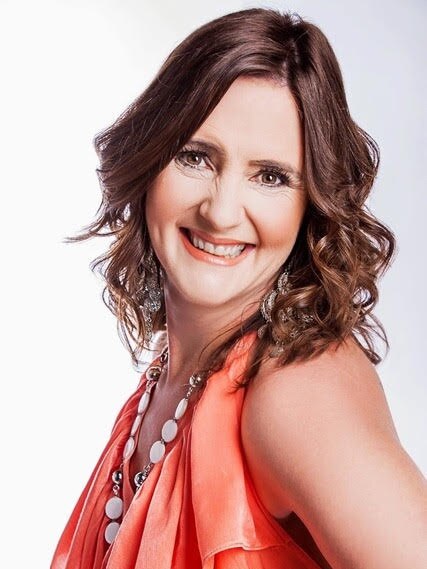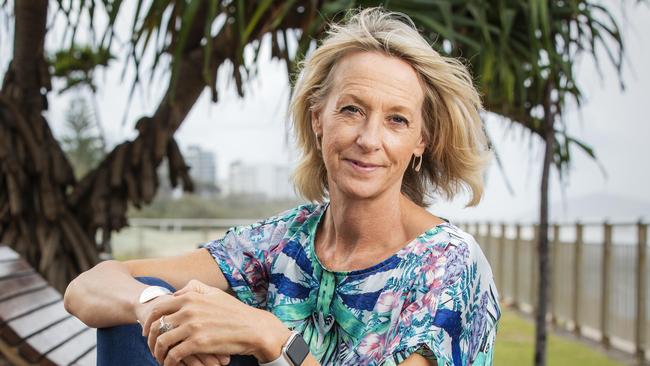WorkHaven domestic violence support program delivers the tools employers need to help survivors heal from trauma and abuse
The kind words of a person she worked with made all the difference for domestic abuse victim Jane Barlow whose life was made a living hell by a former partner. Wanting to pay the kindness forward, Jane joined an innovative employer-based program that turns work into a safe haven.
Sunshine Coast
Don't miss out on the headlines from Sunshine Coast. Followed categories will be added to My News.
WITH the shadow of middle-age looming, Jane Barlow teetered on the precipice of the unknown after surviving – and leaving – an abusive relationship.
Looking back on that horrible part of her life, Jane admits taking the first step out the door was the hardest, but that support came from the most unlikely of places – her work.
Jane’s story of trauma and triumph will help inform discussions about the role employers have in responding to domestic and family violence when civic and community leaders attend the 2021 Asia Pacific Cities Summit and Mayors’ Forum Special Edition (2021 APCS Special Edition) in Brisbane from September 8 to 12.
In a tale that is all too common across Australia, Jane fell in love with a charming and charismatic man who had all the hallmarks of a ‘perfect partner’.
He was a kind, considerate, supportive and emotionally available lover so the smart sassy and elegant woman believed she could create a happy home with him.
During the moments of bliss though, Jane felt the stirring of misgivings as he convinced her to give up her own studies so she could support him while he was starting a new career path.
She now sees this as a very early red flag, but Jane says he was manipulative enough to make her believe that it was the best thing for both of them.
It was hard, she says, to put her dreams on the backburner, but for the sake of the relationship she decided she would juggle homecare duties with working as a cleaner and building a successful and thriving business.
It did not take long for more cracks to appear in her lover’s façade.
At first it was acts of coercive control: A complex often non-physical but emotionally harmful pattern of behavior that may include intimidation and humiliation designed to wear down the victim’s psychological barriers.
In Jane’s case, her partner’s tactics included isolating her from her friends and loved ones; limiting her control of, and access to, money; monitoring her movements; and abusing her emotionally.
He would trace her movements and even stalked her, often unexpectedly appearing at events and gatherings she wanted to attend alone.
Over time the abuse increased.
“He would slam the furniture and be aggressive,” the 49-year-old says.
“I hoped it would get better.
“I believed if I did the right thing and showed respect, concern and compassion for him that things would be different – that I wouldn’t have to be walking on eggshells all the time.
“I’d just go to work every day, hoping that things would be ok when I got home - but they never were.”
One of Jane’s cleaning clients was a police officer.
It was this woman who helped her realise that things would not improve and that Jane needed to salvage what she could of her finances, her possessions and her mental and emotional well-being to start afresh.
Leaving her home and business behind, Jane reached out to support agencies including Brisbane Domestic Violence Service.
With their help, the care of a psychiatrist, a small financial bequeathment from a family member and government income support, Jane was able to return to return to study with her end goal of becoming a social worker.

At the tail-end of her university degree, living in safety and feeling happier than ever, Jane agreed to share her experience in an employer-based domestic violence project developed by WorkHaven.
The nine-month-old ‘profit with a purpose’ business helps employers understand the many complexities of domestic and family violence so they are able to respond appropriately to employees facing abuse.
WorkHaven is the brainchild of family violence survivor Jo Mason and her co-founder David Wilson.
The pair pride themselves on being “committed to developing a culture of zero tolerance towards domestic and family violence” across the country.
In its first year of operation, the little business that could has worked with a myriad of government and private employers including QBCC, SEQ Water, the Queensland Department of Transport and Main Roads, Verizon, Icon Healthcare and Brisbane City Council.

Jo will be one of the presenters at the 2021 APCS Special Edition summit, where she and David hope to impress more civic leaders about the potential to change – and maybe even save – lives.
Just a cursory glance at Australia’s domestic and family violence statistics shows WorkHaven faces a massive challenge, yet David says workplaces need to accept that they hold a key role in reducing the impact and prevalence of the epidemic that impacts one in four Australian women.
Reputable data sources - including the Australian Bureau of Statistics, ANROWS and Our Watch – all publish research that clearly shows violence against women is one of the biggest social justice issues facing the nation.
Women are three times more likely than men to experience intimate partner violence.
Police will, on average, attend more than 600 domestic violence cases on any given day in Australia.
Around 70 women are hospitalised weekly for treatment to injuries inflicted by a current or former lover.
At least one woman a week is killed as result of violence at the hands of a loved one - already this year, 35 women have been lost to murder or manslaughter with most of these victims allegedly killed during acts of domestic violence.
The more marginalised a woman is, the more likely she is to experience abuse: For example, rates of violence are much higher against Indigenous women, women with disabilities, ethnic women and women who are transgender or in same-sex relationships.
The epidemic of abuse, experts say, is driven broadly by four ‘gendered drivers’: The condoning of violence against women (i.e saying the victim is to blame or that violence in certain circumstances can be excused); men’s control of decision-making across all areas of Australian life including the idea that males are the head of the household or that they make better leaders; set gender roles and stereotypes of what it means to be masculine or feminine; and disrespect towards women, which may include things as simple as sexist jokes.
This is further exacerbated by a raft of social problems including addiction, childhood exposure to violence and socio-economic inequality also contribute to the problem.
Violence against women costs Australia’s economy around $21.7b a year – including lost productivity due to both victims and perpetrators needing time off work for legal, housing, safety and other issues - so it makes perfect economic sense for businesses to play a strong role in combatting the problem.
Whilst most organisations want to take a stand against domestic and family violence they simply do not know where to begin and this is usually because they do not understand why it happens, David says.
He says here is no ‘one size fits all’ solution and that means workplaces need to take a multifaceted approach.
Most recently, WorkHaven has partnered with Brisbane City Council for a six-month pilot program, providing the organisation with an effective communication strategy that features videos of survivors – including Jane – who relive their experiences in the hopes of reducing myths and misconceptions around domestic violence.
The business has also developed a coaching program that helps survivors who work for the council to rebuild their lives.
“The coaching is done online or it can be offered in person,” David says.
“It looks at all the facets of your life including your job, your self-esteem, your confidence and your inner-strengths and it covers practical areas including your home, your pets and your children - the coaching touches on every area of life that is impacted by the abuse.
“It is about allowing businesses to help their people rebuild their lives while raising awareness and reducing the stigma associated with domestic violence.”
David says his organisation’s involvement in this week’s summit will give local governments the opportunity to understand how they can make meaningful change.
“Councils are in a unique position to do something in this space because they can influence other levels of government and - because they have large workforces and work at a grassroots level - they can also impact their local community,” he says.
“These impacts can be significant.”
Brisbane Lord Mayor Adrian Schrinner says his organisation considers keeping women and children safe from abuse an important part of local governance.
“The protection of women and children from distressing home environments is an absolute priority and supporting those within our own organisation to move beyond this challenge is essential for their safety and wellbeing,” Cr Schrinner says.
“Partnering with WorkHaven will give us the tools, insight and information to help facilitate the right conversations with our colleagues.
“Through our partnership with WorkHaven, and through our support for organisations like Small Steps for Hannah and Beyond DV, we are committed to ensuring women feel supported and empowered when caught in crisis.”
Reflecting on her own experiences, Jane says if it wasn’t for making connections with people through work she may still be trapped in an abusive relationship.
“I cannot express how important it is to tell someone at your job about what is happening,” she says.
“Your supervisor could be your safe space - they could be the ones who help you leave.
“It is okay to speak to your work about what is going on.
“You might feel some shame but they won’t judge you.”
Jane hopes all Australian employers will step-up to educate their staff on the many complex facets of domestic and family violence – including the abuse that never leaves bruises or broken bones.
“It’s important for senior staff and management to continue to learn that physical violence is a result (of coercive control),” she says.
“A lot of this is unseen and it manifests differently for each person.
“Sometimes I had wished he’d left physical bruising or damage where people could see it.”
News Corp’s Sherele Moody has multiple journalism excellence awards for her work highlighting violence in Australia. Sherele is also an Our Watch fellow, the founder of The RED HEART Campaign and the creator of the Australian Femicide & Child Death Map and All That Remains: The Memorial to Women and Children Lost to Violence.
FOLLOW SHERELE ON TWITTER & FACEBOOK: twitter.com/ShereleMoody; https://m.facebook.com/sherele.moody




